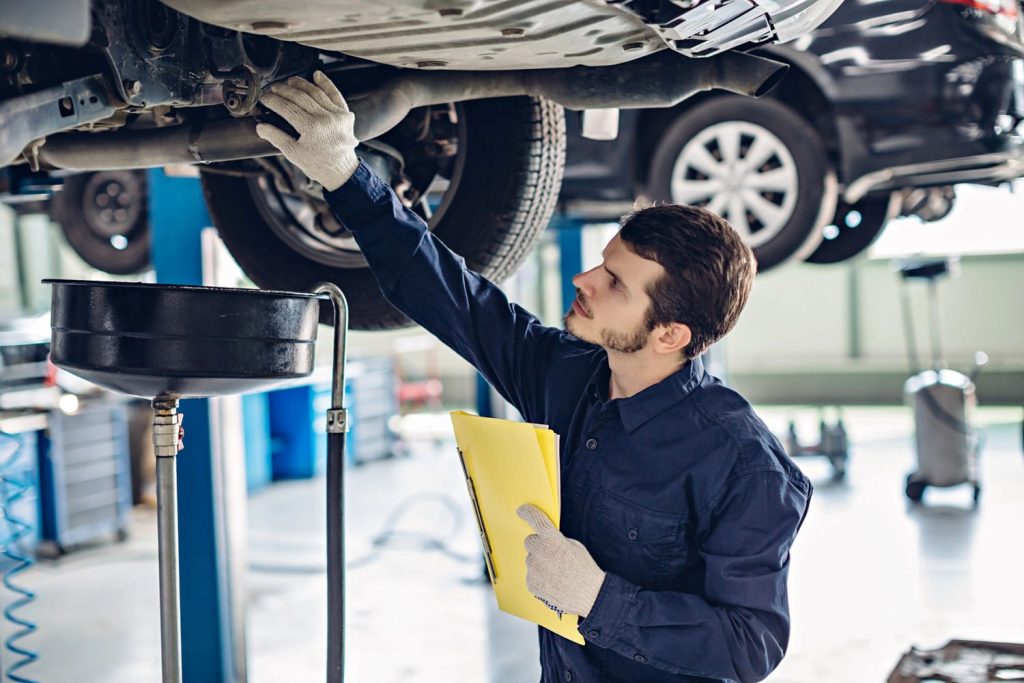Why an Auto Inspection Matters
An auto inspection is more than just another item on your to-do list. It’s a safeguard for your life, your passengers, and everyone else sharing the road with you. Think of it like your annual health check-up. Just as doctors look for warning signs in the body, an auto inspection spots potential issues in your vehicle before they turn into disasters.
In places like Taylor Acres, where daily commutes, school runs, and weekend road trips are part of everyday life, having a car that’s safe and reliable isn’t optional, it’s essential. An inspection also keeps you legally compliant, improves resale value, and gives you the confidence to drive without constantly second-guessing whether your car can handle the road.

How Vehicle Inspections Work
Vehicle inspections follow a structured process that ensures every essential system is reviewed. Most inspections cover three main areas: safety equipment, mechanical performance, and emissions standards. The inspector uses both a visual check and physical tests to confirm everything works as intended.
Typically, inspections include:
- Turning on the lights, signals, and wipers.
- Checking seat belts, airbags, and horns.
- Measuring tire tread and brake performance.
- Reviewing the engine for leaks or unusual wear.
- Ensuring emissions comply with state regulations.
If your vehicle passes, you get an inspection certificate or sticker. If it fails, you’ll receive a detailed report showing what went wrong, and you’ll be expected to repair the issues before coming back for a re-check.

What Inspectors Look For
Inspectors don’t dig into every bolt and nut; they focus on parts that directly affect safety and emissions. They check:
- Lights and signals for visibility.
- Brakes and tires for control.
- Glass and mirrors for clear sightlines.
- Exhaust and emissions systems for compliance.
- Safety restraints like seat belts and airbags.
Pass / Fail: What It Really Means
A pass means your car is safe for the road and meets all required standards. A fail doesn’t mean the end of the world, it’s simply a red flag that some part of your car needs attention. For example, a failed brake light might only need a $10 bulb replacement. Once the fix is complete, you return for a follow-up, often at a reduced fee.
Preparing Your Vehicle for Inspection
Getting your car ready doesn’t need to be stressful. A little preparation the day before can dramatically improve your chances of passing on the first try.
Tips include:
- Check all the lights. Even one burned-out bulb can cause a failure.
- Top off fluids. Low oil, coolant, or washer fluid raises concerns.
- Inspect your tires. Look for bald spots or uneven wear.
- Listen for noises. Clunks, squeals, or grinding suggest mechanical trouble.
- Clean the car. While appearance won’t affect pass/fail, a tidy vehicle helps inspectors see clearly.
Quick Pre-Inspection Walkaround
This takes less than 15 minutes but prevents common failures:
- Walk around your car while activating lights and signals.
- Check mirrors and glass for cracks.
- Ensure wipers sweep cleanly.
- Test the horn.
- Tug each seat belt and confirm smooth operation.
- Peek under the car for leaks.
Exterior Checklist
The outside of your car speaks volumes to an inspector. It reveals how well you’ve maintained the vehicle and whether it poses immediate safety concerns.
Lighting & Signals
Headlights should be bright and properly aimed. Turn signals must blink at the correct speed. Brake lights should respond instantly. If any bulb flickers or fails, replace it before the inspection.
Glass, Mirrors & Windshield
Inspectors need to confirm clear visibility. A cracked windshield, especially in the driver’s line of sight, is a common reason for failure. Mirrors should be intact, steady, and provide a full field of view.
Doors, Hood & Trunk
Inspectors will tug at doors and latches. If your hood or trunk pops open too easily, it’s a hazard. Check hinges and locks to make sure everything holds firmly.
Interior & Safety Equipment Checklist
Inside the car, inspectors check whether safety equipment works and whether warning lights reveal deeper issues.
Seats, Seatbelts & Restraints
Seat belts should retract smoothly and lock firmly when pulled suddenly. Damaged or frayed belts almost always fail inspection. If you have child seat anchors, they need to be functional.
Airbags & Warning Lights
If your dashboard shows an airbag or SRS warning light, it signals a malfunction. This is an automatic fail until repaired. Modern vehicles often need a diagnostic scan to identify the exact problem.
Wipers, Washers & Visibility
Wipers that leave streaks or chatter across the windshield need replacement. Washer fluid should spray evenly and cover enough glass to ensure clear vision in poor weather.
Under the Hood: Engine & Fluids
Inspectors won’t tear down your engine, but they will check for leaks, worn belts, and dangerously low fluids.
Key areas include:
- Oil: Inspectors look for leaks or dangerously low levels.
- Coolant: Prevents overheating; leaks often show as green or orange stains.
- Belts & Hoses: Cracked, frayed, or loose belts can cause a breakdown.
- Battery: Corrosion or loose terminals lead to electrical failures.
Brakes, Tires & Suspension Checklist
Your car’s stopping power depends on these components. Inspectors take them seriously.
Tire Tread, Pressure & Condition
Bald tires or bulging sidewalls are unsafe. Use a tread gauge or a simple coin test to confirm depth. Proper tire pressure improves safety and helps you pass inspection.
Brake Inspection Basics
Inspectors check for pad thickness, rotor condition, and smooth braking. Grinding noises or a soft pedal often signal problems.
Suspension & Steering
If your car bounces excessively after hitting a bump, your shocks or struts may be worn. Loose steering or clunking noises during turns are also red flags.
Electrical System & Battery
A weak battery or faulty alternator can cause dashboard lights to flicker. Inspectors will notice. Tighten terminals, clean corrosion, and replace old batteries before the test.
Emissions & Exhaust
Modern inspections often require an emissions test. A lit check engine light is usually an automatic fail. If your exhaust system is visibly damaged or emits heavy smoke, repair it before inspection.
Signs of Exhaust Trouble
- Blue smoke: Burning oil.
- Black smoke: Fuel mixture problem.
- White smoke: Coolant leak into the engine.
Documentation & Paperwork You Need
Always bring:
- Vehicle registration.
- Proof of insurance.
- Driver’s license or valid ID.
- Previous inspection records (if required).
- Repair receipts (for re-tests).
Common Fail Items and Quick Fixes
Most inspection failures are simple issues:
- Burned-out bulbs → Replace quickly.
- Worn wipers → Easy DIY fix.
- Low fluids → Top off before inspection.
- Loose mirrors → Tighten or replace hardware.
- Brake light switch issues → Often fixed in under an hour.
DIY Prep vs. Professional Help
Handle basic tasks, bulbs, wipers, fluids, yourself. For brakes, engine codes, or suspension, get professional assistance. Don’t gamble with safety by cutting corners.
Texas First Auto Inspections, Your Taylor Acres Inspection Hub
When it comes to professional vehicle inspections in Taylor Acres, Texas First Auto Inspections is a trusted name.
Local shops like this know the community’s driving habits, the road conditions that affect cars, and the state’s inspection requirements. Their team makes the process less intimidating by guiding you step-by-step and offering advice if your car doesn’t pass on the first attempt.
Day-Of Inspection Checklist
Before you roll in:
- Double-check all lights and signals.
- Make sure paperwork is in the glovebox.
- Remove unnecessary clutter from the car.
- Do a quick tire pressure and oil level check.
- Arrive early and stay calm.
After the Inspection: Passing, Failing, Next Steps
If you pass, you’ll receive a certificate or sticker. Keep a copy in the car at all times. If you fail, don’t panic, use the report as a repair roadmap. Fix the issues promptly, keep receipts, and return within the allowed time for re-testing.
Tips to Pass on the First Try
- Replace small parts like bulbs and wipers before inspection.
- Keep fluids topped off.
- Check for dashboard warning lights.
- Test the horn and seat belts.
- Keep tires properly inflated.
Tools & Supplies to Keep Handy
A small roadside kit can save the day:
- Flashlight
- Spare bulbs and fuses
- Tire pressure gauge
- Jumper cables
- Socket set and screwdrivers
- Washer fluid and gloves
Texas First Auto Inspections Serving the Taylor Acres Community and Beyond in Houston
Texas First Auto Inspections is dedicated to serving the diverse needs of the local community of Houston, including individuals residing in neighborhoods like Taylor Acres. With its convenient location near landmarks such as the Church of Christ At Westfield and major intersections like W Hardy Rd. and Hardy Toll Rd. (coordinates: 30.01935,-95.40258), we offer used auto inspection Houston services.
Get Used Auto Inspection at Taylor Acres Now
Navigate from Taylor Acres to Texas First Auto Inspections Now
Where Preparation Meets Protection on the Road
A car inspection shouldn’t feel like a guessing game. With a practical checklist, some preparation, and the right mindset, you’ll breeze through the process.
Drivers in Taylor Acres can count on Texas First Auto Inspections for professional guidance and a smooth inspection experience. A safe, reliable car isn’t just about compliance, it’s about protecting yourself and everyone around you.
FAQs
1. How long does an auto inspection take?
Most of our inspections last 30–45 minutes, though wait times vary depending on the shop.
2. Can I drive if my car fails the inspection?
You can drive temporarily, but you’ll need to fix the problems and return for a pass to stay compliant.
3. Does tire tread depth really matter?
Yes. Worn tires drastically reduce braking ability and handling, especially in wet weather.
4 What happens if my check engine light is on?
In most cases, an illuminated check engine light causes an automatic fail. Get a diagnostic scan before inspection.
5. Why should I choose Texas First Auto Inspections in Taylor Acres?
They provide professional, community-focused service and know exactly what inspectors in your area look for. Their team helps you correct issues quickly and pass with confidence.





